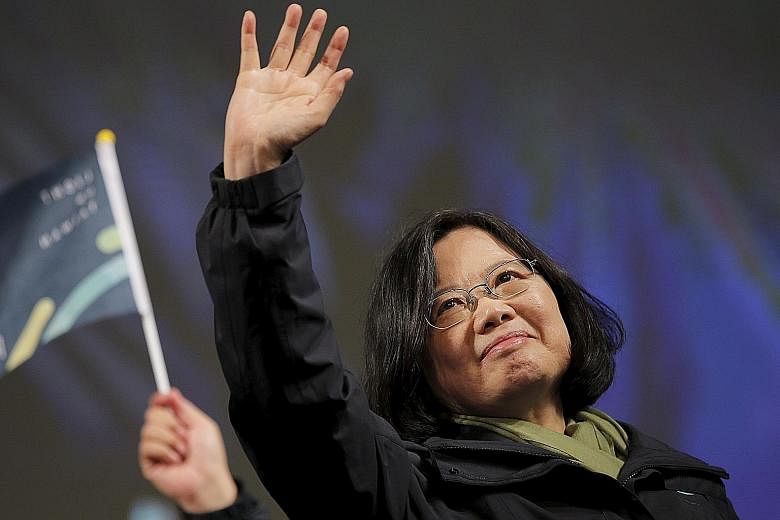With over two months to go before Taiwan inaugurates new president Tsai Ing-wen, Beijing is laying out chess pieces in the hopes of influencing her China policy, say analysts.
On May 20, Ms Tsai will delineate her stance on cross-Strait relations - the most delicate issue for the pro-independence Democratic Progressive Party (DPP) chairman.
The biggest question is how she intends to maintain the "status quo", without endorsing the one-China principle inherent in the so-called 1992 Consensus which Beijing has warned is the bedrock for stability.
The consensus, which refers to an understanding that there is one China, but with differing interpretations of what that is, had underpinned warming ties across the Taiwan Strait for the past eight years.
Ms Tsai has been careful to neither accept nor dispute it, saying only ambiguously that it is but "one option".
Over the past week, Chinese leaders have issued a mix of admonishments and cajolery aimed at the Taiwanese leader-in-waiting. President Xi Jinping on Saturday warned against "Taiwan independence" in his first remarks on cross-Strait ties since Ms Tsai's electoral victory in January. He said Beijing's policy would not change with the change in Taiwan's political situation.
On Wednesday, top officials at a State Council briefing said official exchanges could halt if Ms Tsai does not recognise the 1992 Consensus.
Mr Wang Yifu, president of the All-China Federation of Taiwan Compatriots - an organisation for native Taiwanese living in China - yesterday said Ms Tsai must "prove" her party is not pro-independence before Beijing would deal with her. He was speaking on the sidelines of China's annual parliamentary session.
Their remarks followed speculation that China could take a more conciliatory line towards Taiwan, triggered by Foreign Minister Wang Yi's references to the island's "Constitution" two weeks ago.
It was the first public allusion by Beijing to the Republic of China (ROC) Constitution. Both sides do not formally recognise each other's existence, after the Chinese civil war and the retreat of Kuomintang forces to Taiwan in 1949.
In his remarks, Mr Wang called on Ms Tsai to respect the Constitution that states that Taiwan and the mainland are part of one China. Together with an omission of mention of the 1992 Consensus, it led to hopeful talk in the Taiwanese media and by pundits that there could be a softening of Beijing's stance.
Professor Chu Jintao, an expert on Taiwan affairs at the Chinese Academy of Social Sciences, told The Straits Times it is possible for Beijing to accept a status quo in relations, without demanding that Ms Tsai explicitly affirm the 1992 Consensus.
"At this point, what is key is for Taiwan and the mainland to get to know each other better," he said.
Striking an upbeat note, he added: "From our observation, she won't be like Chen Shui-bian." He was referring to Taiwan's previous DPP president who rankled Beijing by pursuing an explicit pro-independence agenda.
At the same time, Mr Xi's comments on the issue "increase pressure" on Ms Tsai to accept the one-China principle, he said.
Professor Wu Yu-shan of Taiwan's Academia Sinica dismisses as wishful thinking that Beijing was recognising the ROC Constitution.
"Beijing is simply trying to do everything, and say everything, to lure Tsai to (accept) one China," he said. "Such desperate moves show Beijing lacks control."
There remains an "unbridgeable gap" between the two sides, he said. "I am sure secret envoys have been shuffling across the Taiwan Strait for some time, but they are stuck too."
Dr Zheng Zhenqing of Tsinghua University does not preclude the possible use by Beijing of "various tools" to sway Ms Tsai in the run-up to May 20. These, he says, could range from economic sweeteners to curtailing Taiwan's global space.
But, warns Prof Wu, punishment meted out by Beijing would just add to Ms Tsai's popularity at home.
Relations will remain calm after the inauguration, he said. The time of reckoning will be two years on if Taiwan's economy does not improve and Ms Tsai's honeymoon period with voters is over. "China-bashing is political steroids," he said.
Ultimately, the 1992 Consensus - while increasingly discredited within Taiwan - had helped reduce tensions across the Strait, he added.
"The new DPP government and Beijing will need to find a functional equivalent if they jettison it."

